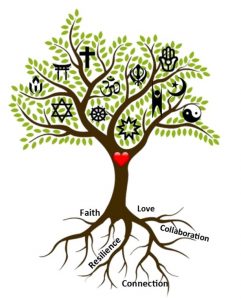Thank you to All Who Attended and Helped Make Jan. 30 Convening a Success!
 See Photos
See Photos
See Videos
See Workshop Descriptions
See Presentation Materials
See Program for the day
See Speaker Biographies
Together, we:
- learned about the intersection of faith, trauma and resilience,
- learned practical ways to promote healing and build resilience in our communities, and
- discovered concrete actions we can take to create, model and guide transformation to become trauma-responsive and healing-engaged congregations and communities.
Thank you to:
- dynamic speakers and workshop leaders who challenged us and inspired us;
- volunteers who helped logistics run smoothly and worked hard to make sure participants felt comfortable and at home;
- Share Fair participants who shared their wisdom and what it means to be trauma informed and healing engaged, and
- participants who shared their enthusiasm, spirit and ideas on how to become healing-engaged congregations and communities.
See Workshop Descriptions
Option 1: Dealing with Domestic Violence in the Parish. Father Chuck Dahm, Pastor, St. Pious V Catholic Church. Father Dahm discussed signs and symptoms of domestic violence; how to recognize the impact of domestic violence, and how to identify small- and big-scale practical ways to become a trauma-informed and healing-engaged community of faith
Option 2: Eight Blocks at a Time: A Community-Based Approach to Building Resilience. Rev. Dr. Carolyn Vessel, Founder and CEO, I AM ABLE Center for Family Development, Inc. Rev. Dr. Vessel discussed a faith-rooted community-based model for building resilience. For 27 years I AM ABLE, a Christian faith-based Community Mental Health Center, has been providing clinical and psychosocial services at the community level. Through a variety of trauma-informed-care programmatic offerings, our family systems, strengths-based agency serves those at the fringes of life and turns no one away.
Option 3: Nurturing Psychological and Spiritual Wellness in the Muslim Community. Dr. Fahad Khan, Deputy Director and Clinical Director, The Khalil Center. Dr. Khan discussed the sources and impacts of trauma in the Muslim community and how to incorporate practical methods of promoting psychological and spiritual wellness in the Muslim community.
Option 4: Restorative Justice Practices: A Relationship-Building Approach. Minister Attorney Michelle Day, Founder and CEO, Nehemiah Trinity Rising. Restorative Justice emphasizes building interpersonal and systemic relationships that prevent or repair unjust behavior through collective efforts. It is both a way of life which fosters the existence and continuity of a strong community and a process that creates space for truth telling and healing to happen where harm has occurred. This workshop offered experiences of a variety of restorative justice practices that can be practiced in a faith-based setting as part of the commitment to being healing engaged.
Option 5: Resilience and Healing for Those Who Provide Support for Others. Staycie Flint, Chaplain, Advocate Children’s Hospital. When we journey with each other through times of crisis, trauma or adversity, we take each other’s burdens into our own bodies and spirits. This conversation provided space for participants to talk about how we can nurture our own thriving as we walk alongside others in times of stress.
Option 6: Recognizing and Healing Inequities & Oppression in Faith Communities. Rabbi Menachem Cohen, Mitzuit Jewish Community, Spiritual Director, Game Designer. Faith communities are human institutions and we often inflict wounds on each other through judgement, exclusion, abuse, or spiritual harm. This workshop explored the work of accountability and repair as a central task of becoming trauma informed and healing engaged.
Option 7: Liturgy, Ritual and Prophetic Communication as Approaches to Healing. Rev. Dr. Lis Valle, Assistant Professor of Homiletics, McCormick Theological Seminary. This workshop explored how both formal and informal ritual and liturgy can offer powerful ways for us to process and heal when we experience trauma and adversity as individuals, but also as communities and across history.
Option 8: Addiction, Recovery and Healing—Practices and Approaches in the Jewish Tradition. Cantor Rabbi Rob Jury, Anshe Tikvah. This workshop introduced Jewish practices for recovery and healing of trauma and addiction. Participants had the opportunity to ground themselves in a Jewish sacred text and meditative practice, learn about resources available in the Jewish community to address trauma and addiction. The workshop also had a brief question and answer period for participants to explore incorporating these spiritual practices in their own context.
See Presentation Materials
Ways to Improve Parish Response to Domestic Violence, Father Chuck Dahm, Presenter
Faith Rootedness, Trauma and Resilience, Rev. Dr. Barbara Wilson, Presenter
Addiction Definition Twelve Steps, Cantor Rabbi Rob Jury, Presenter
Recovery Meeting List, Cantor Rabbi Rob Jury, Presenter
Resources for Substance Use Disorder Chaplaincy, Cantor Rabbi Rob Jury, Presenter
I AM ABLE Center for Family Development, Apostle Dr. Carolyn Vessel, Presenter
Resilience and Healing for Those Who Provide Support for Others, Staycie Flint, Presenter
The Trauma Informed Congregations Movement – Rev. Dr. Shirley Fleming and Rev. Dr. Kirsten Peachey, Presenters



